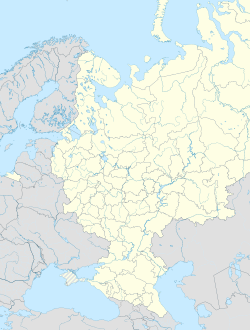Pogar
| Urban-type settlement
Pogar
Погар
|
||||||||||||||||||||||||||||||||||
|
||||||||||||||||||||||||||||||||||
|
||||||||||||||||||||||||||||||||||
Pogar ( Russian Пога́р ) is an urban-type settlement in the Bryansk Oblast in Russia with 9,990 inhabitants (as of October 14, 2010).
geography
The place is a good 100 km as the crow flies southwest of the Bryansk Oblast administrative center , about 20 km from the state border with Ukraine . It is located on the right bank of the Southeast , a right tributary of the Desna .
Pogar administrative center is the Rajons Pogarski and seat and only town of the municipality posselenije Pogarskoje gorodskoje.
history
The place has been known since 1155 and was initially called Radoschtsch or Radogoschtsch . In the 1230s, it was destroyed during the Mongol invasion of the Rus . In the second half of the 15th century Radoschtsch came to the Grand Duchy of Lithuania ; from 1500 it belonged again to the Grand Duchy of Moscow until it came back to Poland-Lithuania in 1618 through the Treaty of Deulino as a result of the Polish-Russian war . During this period the place was destroyed several times, for example in 1534 and 1563 when it was completely abandoned for some time. After the repopulation, the place bore its current name, based on the Russian pogorely, something like "burned down". As such, he received city rights under Magdeburg law around the middle of the 17th century , before finally coming to Russia in 1654 with the Ukraine on the left bank .
In 1781 Pogar became the administrative seat of one of the Ujesds of the short-lived governorship of Novgorod-Seversky ; With its dissolution in 1796 it lost its administrative function and from then on belonged to Ujesd Starodub , from 1802 part of the Chernigov governorate .
On May 25, 1919 Pogar lost its town charter and was considered a village until July 10, 1938, when it was granted urban-type settlement status. In 1929 Pogar became the administrative seat of a newly created Rajons named after him.
During the Second World War , Pogar was occupied by the German Wehrmacht from August 29, 1941 to September 21, 1943 .
| year | Residents |
|---|---|
| 1897 | 4,965 |
| 1939 | 5,941 |
| 1959 | 6.351 |
| 1970 | 7,098 |
| 1979 | 8,063 |
| 1989 | 9,959 |
| 2002 | 11,471 |
| 2010 | 9,990 |
Note: census data
traffic
Pogar has a train station at kilometer 56 of the Unetscha - Druzhba ( Khutir-Mychajliwskyi station ) - Vorozhba railway line, opened in 1931 , which was built as part of the Orsha - Kharkiv long-distance line . Due to the collapse of the Soviet Union , the entire route was divided between Belarus , Russia and the Ukraine, where it crosses the state border several times and was gradually shut down in sections; so also the section southeast of Pogar towards Ukraine. After the cessation of the previously modest passenger traffic in 2013, the current terminal station Pogar, a few kilometers southwest of the settlement, is only used sporadically by freight traffic.
To the far south-east, the settlement is bypassed by the regional road 15K-2001/1902/1901, which branches off the federal highway A240 about 40 km north near Potschep and leads to the Ukrainian border (from there further as the regional road R 12 to Chernihiv ).
Web links
Individual evidence
- ↑ a b Itogi Vserossijskoj perepisi naselenija 2010 goda. Tom 1. Čislennostʹ i razmeščenie naselenija (Results of the All-Russian Census 2010. Volume 1. Number and distribution of the population). Tables 5 , pp. 12-209; 11 , pp. 312–979 (download from the website of the Federal Service for State Statistics of the Russian Federation)
- ↑ Pogar . In: Энциклопедический словарь Брокгауза и Ефрона - Enziklopeditscheski slowar Brokgausa i Jefrona . tape 14 [27]: Калака – Кардам5. Brockhaus-Efron, Saint Petersburg 1895, p. 19 (Russian, full text [ Wikisource ] PDF ).


